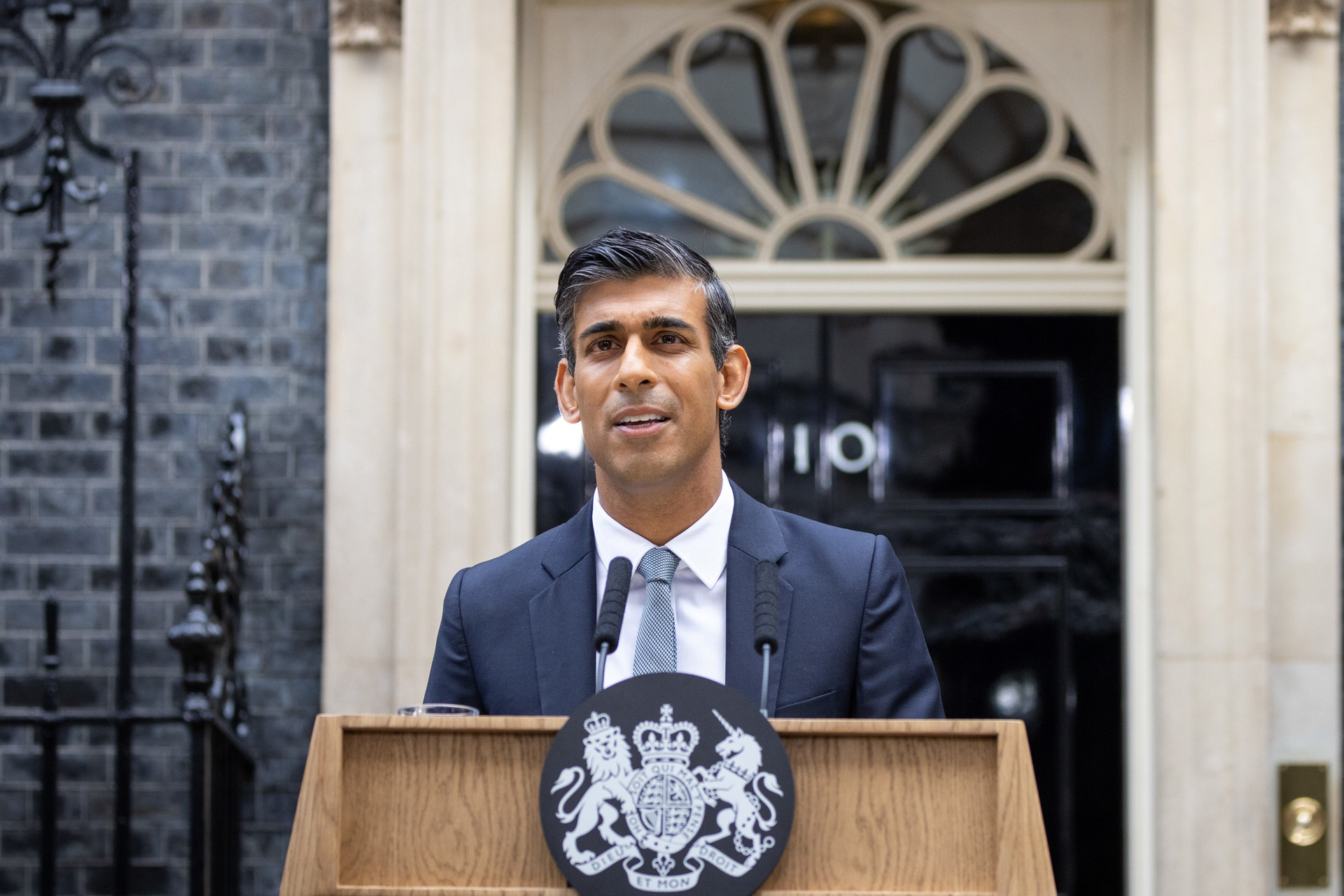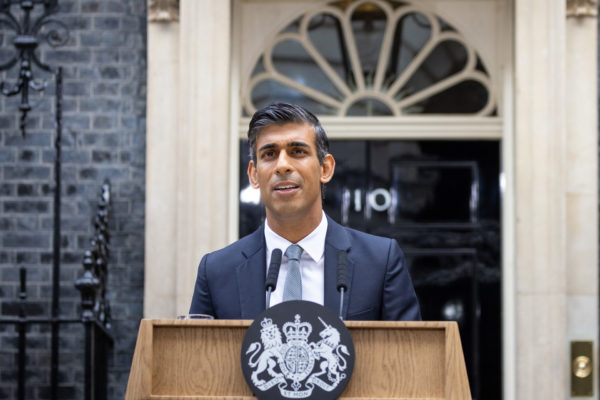A Nutritionist’s Take on Rishi Sunak’s Fasting Diet
By
1 year ago
An expert's guide to fasting, from the potential health benefits to the risks

Everyone’s talking about fasting right now – and it’s all thanks to Rishi Sunak. A source close to the Prime Minister revealed he undertakes a 36-fast at the beginning of each week, which Sunak later confirmed, telling the BBC: ‘I tend to try and do some fasting at the beginning of every week as part of a general balanced lifestyle but everyone will do this differently.’
He’s not the only one: intermittent fasting is both an integral part of some religions, and a hugely popular health trend. So should we all be giving it a go? Here, nutritionist Kim Pearson answers all our questions.
A Nutritionist’s Take on Rishi Sunak’s Fasting Diet

Lauren Hurley / No 10 Downing, OGL 3, via Wikimedia Commons
What Is Rishi Sunak’s Fasting Diet?
Rishi Sunak has shared the specifics of his weekly 36-hour fast in an appearance on ITV’s This Morning. Sunak explained that he refrains from eating from 5pm on Sunday until 5am on Tuesday, describing it as a ‘little reset’ at the beginning of each week. This fasting practice aligns with his Hindu faith where fasting holds spiritual significance and is understood to purify the body and mind.
Despite his schedule, including nationwide visits and preparations for Prime Minister’s Questions, reports suggest that Sunak abstains from consuming any food on Mondays as part of his fasting routine. The 36-hour weekly fast highlights his commitment to both his religious beliefs and personal health and wellbeing.
What Is The Monk Fast?
The Monk Fast involves abstaining from food, drinking only water and other calorie-free drinks like black coffee or tea, for 36 hours once a week.
What Are The Benefits Of Fasting For 36 Hours?
Fasting for 36 hours can offer various potential benefits. During this period, the body shifts from utilising glucose to tapping into stored fat for energy, which can support weight loss. The prolonged fasting period may contribute to improved insulin sensitivity, which also promotes weight loss and better blood sugar control.
Extended fasting allows for a more pronounced activation of autophagy, a cellular process that promotes cellular repair and the removal of damaged cells.
Some individuals report enhanced mental clarity and focus during extended fasts, likely linked to the metabolic switch into a state of ketosis where ketones are burned as a primary energy source. While individual experiences vary, incorporating 36 hour fasting cycles cautiously, ideally under expert guidance to begin with, may support overall health and metabolic wellbeing.
How Much Weight Can You Lose On A Fast?
When discussing any type of diet, the most common question I get asked is how much weight someone can expect to lose. The truth is, we are all different. The amount of weight you can lose during a fast varies based on several factors, including the duration of the fast, your starting weight, metabolism, and body composition. In the initial stages of fasting, weight loss is often influenced by the depletion of glycogen stores, water weight and elimination of food from the digestive tract.
During a short-term fast, such as a 24 to 36-hour fast, it’s common to experience a noticeable drop in weight, primarily due to the loss of glycogen and water. Glycogen is glucose stored in muscle and liver cells. The body stores around 3g of water with every gram of glycogen stored so as glycogen levels are used for fuel when the body starts to fast, this water is released contributing to the drop in weight on the scale many people on a fast will experience.
Longer fasts, such as those lasting several days, may lead to more significant weight loss as the body transitions to burning fat for energy. However, it’s important to remember that a substantial portion of the lost weight during extended fasting comes from water and muscle breakdown, not just fat.

Unsplash
Does 14-10 Fasting Work?
The 14-10 fasting method involves a 14 hour fast with a 10 hour eating window. This approach involves restricting food intake to a specific time frame each day for example, eating between 9am and 7pm and fasting from 7pm to 9am. Having worked with many clients to support them in identifying and implementing a daily fasting period, I have found that a daily 12-14 hour fasting period is realistic and achievable for most people. The eating window can be adapted to suit your daily life.
The effectiveness of any fasting regimen can vary from one person to the next and comes down to lifestyle factors and overall health.
What Is The Best Fasting Diet For You?
Identifying the best approach to fasting for you as an individual involves consideration. Firstly, consider your personal goals, whether it’s weight management, improved metabolic health, or something else. Reflect on lifestyle factors, such as your work schedule, social commitments, daily routine and exercise regime to identify an approach to fasting that fits in with your life and is sustainable.
It’s important to remember that what works for someone else may not work for you. Some people find shorter fasting windows more sustainable and comfortable, while others might prefer longer periods. You can always build up your hours of fasting over time.
Experimenting with different fasting approaches, observing how your body responds, and adjusting accordingly can help determine the most effective and sustainable fasting strategy for you. Listening to your body and being mindful of any signs of discomfort or imbalance is key to finding the optimal fasting approach that suits you.
Make sure that when you do eat, your diet is nutrient dense, based on whole foods and contains optimal protein, fibre and healthy fats to keep you from overeating later in the day.
If in doubt, an experienced functional medicine doctor or qualified nutrition expert can provide personalised recommendations based on your unique state of health that aligns with your goals and fits into your lifestyle.
How Often Should You Fast?
A daily fasting window of 12 – 14 hours is realistic for most people. Consistency is key, so aim to do this on as many days as possible and stick to the same eating times wherever possible. More prolonged fasts can be carried out periodically, but it’s a good idea to plan this with the guidance of an experienced expert who can work with you to identify what is a safe and effective approach for you and realistic in the context of your lifestyle.
Is Fasting Bad For You?
While fasting can provide health benefits, it’s not for everyone. Extended or frequent fasting without proper dietary planning can lead to nutrient deficiencies. Some people can experience fatigue, irritability, or difficulty concentrating during fasting periods, partly due to a drop in blood sugar levels. This is typically the case in individuals whose bodies are not adapted to burning stored fat for fuel but often, as periods of fasting are practiced consistently, the body adapts.
People with health conditions like diabetes should seek advice from their doctor before they begin fasting and women who are pregnant or breastfeeding should not go for extended periods without eating. Those with eating disorders are not encouraged to fast unless specifically advised to do so by a medical expert.
It’s vital that we approach fasting with caution and consider individual health, lifestyle, and mental wellbeing. Consulting with a medical doctor or a qualified nutrition expert is advisable before starting any fasting regimen, especially for individuals with pre-existing health conditions.
Fasting should be done in a way that is balanced, sustainable, and does not compromise overall health. It’s essential to stay well-hydrated during fasting periods and prioritise a nutrient-dense diet when eating. Listening to your body and adjusting fasting practices based on individual needs and responses is key to a safe and effective experience.
Kim Pearson qualified as a nutritionist at London’s Institute for Optimum Nutrition in 2008 and has worked in the field of nutrition and health for 20 years. She specialises in weight loss, metabolic health, and longevity. In addition to heading up her UK team of nutritionists, Kim is the clinical director of RoseBar longevity club in Ibiza. She is a full member of CNHC (Complimentary and Natural Healthcare Council) BANT (British Association of Applied Nutrition and Nutritional Therapy) and the Guild of Health Writers. Follow Kim on Instagram @kimmypearson and find out more about her work at kim-pearson.com.






